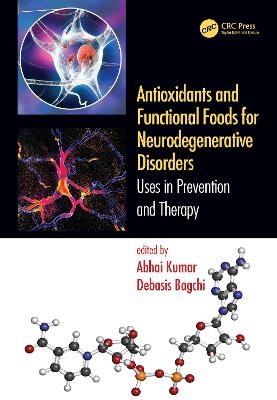
Antioxidants and Functional Foods for Neurodegenerative Disorders
CRC Press (Verlag)
978-0-367-64242-6 (ISBN)
Neurodegenerative diseases, including Alzheimer’s and Parkinson’s disease, are a growing problem across the world’s aging population. Oxidative stress in the brain plays a central role in a common pathophysiology of these diseases. This book presents scientific research on the potential of antioxidant therapy in the prevention and treatment of neurodegenerative disorders.
This book outlines the roles of oxidative stress and diabetes mellitus in neurodegeneration, describes the molecular mechanisms of neurodegenerative disorders including the roles of environmental pollutants and inflammatory responses, and explores mitochondrial dysfunction. It then describes the protective abilities of antioxidants – including vitamin D, tocotrienol and coenzyme Q10 – against neurodegeneration. The book demonstrates the therapeutic potential of ketogenic diets, and highlights the roles of medicinal plants, phytopharmaceuticals, traditional medicines and food nutrients in neuroprotection.
Key Features:
Explains damage caused by numerous neurodegenerative disorders and the possible protection offered by antioxidants and functional foods.
Describes molecular mechanisms of neurodegeneration by oxidative stress, advancing age, diabetes and mitochondrial dysfunctions.
Demonstrates protection offered by nutraceuticals, antioxidants, botanical extracts and functional foods.
The book contains twenty-three chapters divided into six sections written by leading researchers. This book is essential reading for health professionals, dietitians, food and nutrition scientists and anyone wanting to improve their knowledge of etiology of neurodegenerative diseases.
Abhai Kumar, Ph.D., received his Ph.D. degree in Biotechnology in 2008. Dr. Abhai is currently working as Research Scientist at DBT-BHU Interdisciplinary School of Life Sciences and Consultant Research Scientist at Department of Neurology, Institute of Medical Sciences, Banaras Hindu University, Varanasi, India. Dr. Abhai served as Postdoctoral Fellow at University of Pittsburgh, Pittsburgh, USA from 2008 to 2010. Dr. Abhai identified several novel drug targets during his work at University of Pittsburgh, USA. He worked at India most prestigious institute National Institute of Immunology, New Delhi on glycoproteomics for drug targets of cancer . Dr. Abhai has published many research articles in journal of high impacts and wrote book chapter in various prestigious international books. He is reviewer of several journals and editorial board member. He is also working as ex-officio member of ‘Chand Foundation’ a voluntary organization dealing with mental health of elderly people in India. Dr. Abhai research interests include neurodegenerative disorders, free radicals, human diseases, anti-ageing and anti-inflammatory pathophysiology, and cognition. Debasis Bagchi, PhD, MACN, CNS, MAIChE, received his Ph.D. in Medicinal Chemistry in 1982. Dr. Bagchi is a Professor in the Department of Pharmacological and Pharmaceutical Sciences at the University of Houston, College of Pharmacy, Houston, TX, and the Chief Scientific Officer, R&D, Cepham Inc. Piscataway, NJ. He is also an Adjunct Faculty of the School of Pharmacy, Texas Southern University, Houston, TX. He served as the Senior Vice President of Research & Development of InterHealth Nutraceuticals Incorporated in Benicia, CA, from 1998 till Feb 2011. Dr. Bagchi received the Master of American College of Nutrition Award in early October 2010. He is currently the Chairman of International Society of Nutraceuticals and Functional Foods (ISNFF), Past President of American College of Nutrition, Clearwater, FL, and Past Chair of the Nutraceuticals and Functional Foods Division of Institute of Food Technologists (IFT), Chicago, IL. He is serving as a Distinguished Advisor on the Japanese Institute for Health Food Standards, Tokyo, Japan. Dr. Bagchi is a Member of the Study Section and Peer Review Committee of the National Institutes of Health (NIH), Bethesda, MD. Dr. Bagchi has 329 papers in peer reviewed journals, 33 books and numerous patents. He has delivered invited lectures in various national and international scientific conferences, organized workshops, and group discussion sessions. Dr. Bagchi is also a Member of the Society of Toxicology, Member of the New York Academy of Sciences, Fellow of the Nutrition Research Academy, and Member of the TCE stakeholder Committee of the Wright Patterson Air Force Base, OH. Dr. Bagchi is the Associate Editors of the Journal of Functional Foods and the Journal of the American College of Nutrition, and also serving as Editorial Board Member of numerous peer reviewed journals, including Antioxidants & Redox Signaling, Cancer Letters, Toxicology Mechanisms and Methods, The Original Internist, and others.
Part 1: Overview & Introduction 1. Role of Oxidative Stress in Neurodegeneration 2. Neurodegeneration in Diabetes Mellitus: An Overview Part 2: Molecular Mechanisms of Neurodegenerative Disorders, Inflammation and Oxidative Stress 3. Oxidative Stress and Inflammation 4. Role of Environmental Toxicants and Inflammation in Parkinson’s Disease 5. Role of Oxidative Stress in the onset of Alzheimer’s disease 6. A Treatise on the Role of Herpes Virus in Neurodegeneration 7. Lipidomic insight into membrane remodeling in ageing and neurodegenerative diseases: Lipids and Fatty acids Part 3: Mitochondrial Dysfunction and Neurodegeneration 8. Mitochondria in Huntington's Disease 9. Mitochondrial Dysfunction in Huntington Disease Part 4: Redox Biology, Neurodegeneration and Antioxidant Cytoprotection 10. The Role of Oxidative Stress in Neurodegeneration and Protection by Antioxidants 11. Role of Vitamin D and antioxidant in the prevention and treatment of Alzheimer’s disease 12. Role of Vitamin D and antioxidant functional foods in the prevention and treatment of Alzheimer’s Disease Pathology 13. Vitamin D and Neuroprotection in Elderly Population 14. Tocotrienol Vitamin E and Neurodegenerative Disorders 15. Implication of Mitochondrial Coenzyme Q10 (Ubiquinone) in Alzheimer’s Disease Part 5: Ketogenic Diets in Neuroprotection 16. Improvement of cognitive function in patients with Alzheimer’s disease via ketogenic diets Part 6: Medicinal Plants and Functional Foods in Neurodegenerative Disorders & Therapy 17. The Potential of Food Nutrients in the Prevention and Amelioration of Cognitive Dysfunction 18. Bioactive Constituents in Indian Medicinal Plants Traditionally Recognized for Brain Health 19. Development of a Synergistic Combination of Huperzia serrata, Convolvulus pluricaulis and Celastruspaniculatusfor Optimal Brain Health and Functions 20. Neurotherapeutic potential of Tinospora Cordifolia 21. Roles of Functional Foods in Neuroprotection 22. Roles of Functional Foods and Nutraceuticals in Neuroprotection: In-Depth Mechanism with Clinical Exploration 23 .Traditional Medicines for Mental Health 24. PerformLyte, A Prodosomed PL425 PEC Phytoceutical-Enriched Electrolyte Supplement Supports Nutrient Repletion, Healthy Blood pH, Neuromuscular Synergy, Cellular and Metabolic Homeostasis 25. Nutritional Interventions for The Prevention Of Neurodegenerative Disorders 26. Commentary
| Erscheinungsdatum | 15.01.2021 |
|---|---|
| Zusatzinfo | 23 Tables, black and white; 33 Illustrations, color; 18 Illustrations, black and white |
| Verlagsort | London |
| Sprache | englisch |
| Maße | 178 x 254 mm |
| Gewicht | 970 g |
| Themenwelt | Sachbuch/Ratgeber ► Gesundheit / Leben / Psychologie ► Alternative Heilverfahren |
| Medizin / Pharmazie ► Gesundheitsfachberufe ► Diätassistenz / Ernährungsberatung | |
| Medizinische Fachgebiete ► Innere Medizin ► Kardiologie / Angiologie | |
| Naturwissenschaften ► Biologie | |
| Technik ► Lebensmitteltechnologie | |
| ISBN-10 | 0-367-64242-5 / 0367642425 |
| ISBN-13 | 978-0-367-64242-6 / 9780367642426 |
| Zustand | Neuware |
| Haben Sie eine Frage zum Produkt? |
aus dem Bereich


